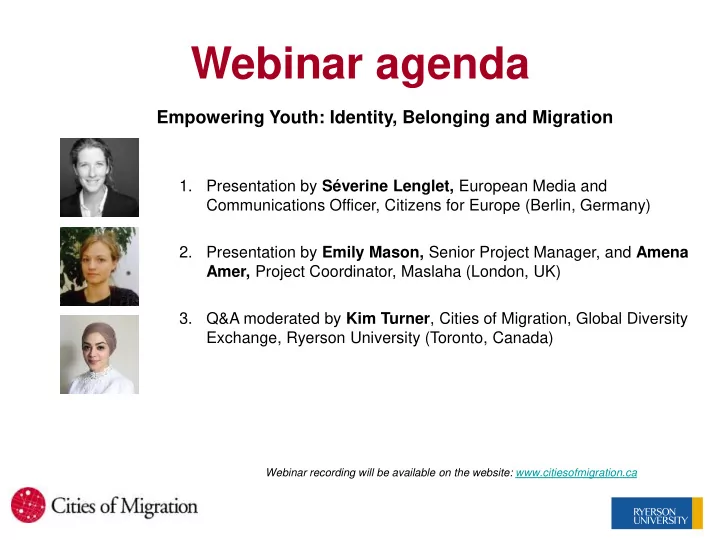

Webinar agenda Empowering Youth: Identity, Belonging and Migration 1. Presentation by Séverine Lenglet, European Media and Communications Officer, Citizens for Europe (Berlin, Germany) 2. Presentation by Emily Mason, Senior Project Manager, and Amena Amer, Project Coordinator, Maslaha (London, UK) Q&A moderated by Kim Turner , Cities of Migration, Global Diversity 3. Exchange, Ryerson University (Toronto, Canada) Webinar recording will be available on the website: www.citiesofmigration.ca
Séverine Lenglet European Media and Communications Officer, Citizens for Europe (Berlin, Germany) 2
NICER EMPOWERING REFUGEE AND LOCAL YOUTH THROUGH PERFORMING ARTS WORKSHOPS
KEY FACTS • Funded by the European Commission • Result of a collaboration between seven partner cities across Europe: Rome (Italy), Sevilla (Spain), Berlin (Germany), Molenbeek (Belgium), Timisoara (Romania), Liverpool (UK), Nicosia (Cyprus). • In each partner city, 15 young refugees and 15 local youth created within four months a musical (from January to April 2017). • Final performances took place in May 2017
CONTEXT IN GERMANY IN 2015, 59% OF THE NEWCOMERS WERE IN 2015, GERMANY RECEIVED ABOUT HALF A UNDER THE AGE OF 24 MILLION NEW ASYLUM APPLICATIONS.
WHAT NEEDS DO NICER ADDRESS? • In Europe, refugees are accommodated in refugee shelters and reception facilities where the opportunities for interaction and exchange with locals are very limited and very often language and cultural barriers can be a major obstacle . • On the other hand, Europe faces a rise of right-wing populism, racism and a generalised anti-immigration sentiment. There is a need to identify and implement innovative instruments to counterbalance this situation .
THEATER, A POWERFUL TOOL • To overcome language barriers, prejudices and discrimination • To provide creative spaces of creation and expression of identities • To foster intercultural dialogue • To allow the expression of challenges, both refugees and the local youth faces • To encourage team building and collective work • Artistic expression creates a level play field where the contribution of each of the participants is equally important.
IMPLEMENTATION: THE STAFF The young people need a regular and committed staff so they can feel secure : • 2 vocal and music coaches • 2 dramaturgy/creative writing coaches • 2 theater directors/drama teachers • 1 language coach • 1 social worker who promoted cohesion and the empowerment of every participant
IMPLEMENTATION: ACTIVITIES • Separated Theater and orchestra trainings • During 3-4 months, outside of the school hours • Each activity: once a week 2-3 hours • Acting, singing, dancing, playing a music instrument • Dramaturgy workshops: • every second Saturday, always after a collective breakfast buffet . • Group discussion on identity, discrimination, migration and right-wing ideologies. • Cross-cultural language training : • 2 hours per week. • Different from the traditional frontal teaching approach • Interaction between locals and newcomers facilitated by a language coach. • Role playing, language choir, storytelling, songs
A PARTICIPATIVE APPROACH • Co-creation: The young participants take complete ownership of the project and are involved in all aspects of the production of the play. • The professional coaches are mostly there to support and guide the young participants in creating the musical, in getting skills such as acting, dancing, creative and song writing, sound and lightning… • The young people choose their own role • The young participants develop and write the dramaturgy together .
„The main instrument of the teacher is the question, not the answer!“
IMPACT AND OUTCOMES • The participants developed their creative skills, self-esteem and “After the project, the majority of them continued socialisation (new friendships; the to take part in the activities of the theater.” theater: a safe space where they “feel home”) • Developed their language skills : were able to perform on stage complex texts in German • developed a critical and analytical mind on complex political issues, learned how to speak out - Multiplicators in their communities • Awareness about the life of refugees and their difficulties
IMPACT ON THE LOCAL COMMUNITY • The audience of the final performances in Berlin: about 600 persons • Activities in schools (about 70 children) • Raise awareness on the life and problems of refugees, on the dangers of right-wing populism • Tackle the prejudices on youth and on refugees
TIPS FOR REPLICATION • Be flexible • Create a safe space where they feel as a young person not as a refugee • Build a trustful relationship • Work with staff with migration • Avoid asking for ID documents backgrounds • Treat the young refugees as equal with • Be aware of the risks of acting on a the local youth neo-colonial and paternalistic perspective • Avoid top-down methods: Co-creation
Thank you! www.citizensforeurope.org Contact: lenglet@citizensforeurope.org
Emily Mason Senior Project Manager, Maslaha (London, UK) Amena Amer Project Coordinator, Maslaha (London, UK) 16
MUSLIM GIRLS FENCE 17
Identity Workshops 18
Fencing/Self Expression 19
Creative Output 20
Public Imagination 21
Science Museum, London 22
Women of the World Festival, Southbank Centre 23
Media Coverage 24
British Context 25
Confidence and Solidarity 26
Changing School Culture 27
Exp Expansio nsion n of of Pro roje ject ct: 5 UK cities – London, Birmingham, Doncaster, Bradford, Glasgow Working in Schools and Communities Le Lesso ssons ns Le Learn rnt: t: Understanding school culture Working within existing community cultures 28
www.MuslimGirlsFence.org @MuslimGirlsFence @Maslaha 29
Acknowledgments Empowering Youth: Identity, Belonging and Migration • Séverine Lenglet, European Media and Communications Officer, Citizens for Europe (Berlin, Germany) • Emily Mason, Senior Project Manager, Maslaha (London, UK) • Amena Amer, Project Coordinator, Maslaha (London, UK) • Kim Turner, Cities of Migration, Ryerson University (Toronto, Canada) www.citiesofmigration.org
Recommend
More recommend